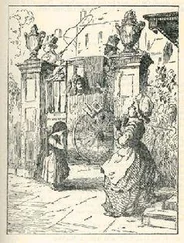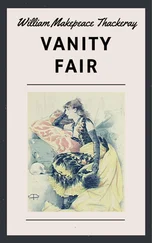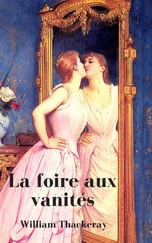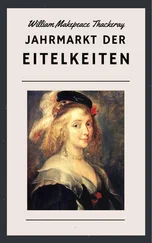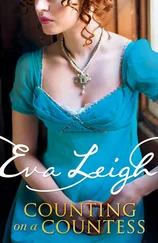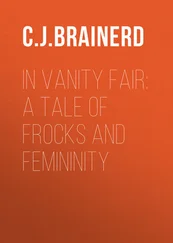William Thackeray - Vanity Fair
Здесь есть возможность читать онлайн «William Thackeray - Vanity Fair» — ознакомительный отрывок электронной книги совершенно бесплатно, а после прочтения отрывка купить полную версию. В некоторых случаях можно слушать аудио, скачать через торрент в формате fb2 и присутствует краткое содержание. Жанр: Классическая проза, на английском языке. Описание произведения, (предисловие) а так же отзывы посетителей доступны на портале библиотеки ЛибКат.
- Название:Vanity Fair
- Автор:
- Жанр:
- Год:неизвестен
- ISBN:нет данных
- Рейтинг книги:5 / 5. Голосов: 1
-
Избранное:Добавить в избранное
- Отзывы:
-
Ваша оценка:
- 100
- 1
- 2
- 3
- 4
- 5
Vanity Fair: краткое содержание, описание и аннотация
Предлагаем к чтению аннотацию, описание, краткое содержание или предисловие (зависит от того, что написал сам автор книги «Vanity Fair»). Если вы не нашли необходимую информацию о книге — напишите в комментариях, мы постараемся отыскать её.
Vanity Fair — читать онлайн ознакомительный отрывок
Ниже представлен текст книги, разбитый по страницам. Система сохранения места последней прочитанной страницы, позволяет с удобством читать онлайн бесплатно книгу «Vanity Fair», без необходимости каждый раз заново искать на чём Вы остановились. Поставьте закладку, и сможете в любой момент перейти на страницу, на которой закончили чтение.
Интервал:
Закладка:
“You don’t stick at a trifle, Mr. Wenham,” he said.
“You flatter me, Captain Macmurdo,” answered the other with a smile. “Upon my honour and conscience now, Mrs. Crawley did ask us to sup after the opera.”
“Of course; and Mrs. Wenham had one of her headaches. I say, I’ve got a thousand-pound note here, which I will give you if you will give me a receipt, please; and I will put the note up in an envelope for Lord Steyne. My man shan’t fight him. But we had rather not take his money.”
“It was all a mistake - all a mistake, my dear sir,” the other said with the utmost innocence of manner; and was bowed down the Club steps by Captain Macmurdo, just as Sir Pitt Crawley ascended them. There was a slight acquaintance between these two gentlemen, and the Captain, going back with the Baronet to the room where the latter’s brother was, told Sir Pitt, in confidence, that he had made the affair all right between Lord Steyne and the Colonel.
Sir Pitt was well pleased, of course, at this intelligence, and congratulated his brother warmly upon the peaceful issue of the affair, making appropriate moral remarks upon the evils of duelling and the unsatisfactory nature of that sort of settlement of disputes.
And after this preface, he tried with all his eloquence to effect a reconciliation between Rawdon and his wife. He recapitulated the statements which Becky had made, pointed out the probabilities of their truth, and asserted his own firm belief in her innocence.
But Rawdon would not hear of it. “She has kep money concealed from me these ten years,” he said “She swore, last night only, she had none from Steyne. She knew it was all up, directly I found it. If she’s not guilty, Pitt, she’s as bad as guilty, and I’ll never see her again - never.” His head sank down on his chest as he spoke the words, and he looked quite broken and sad.
“Poor old boy,” Macmurdo said, shaking his head.
Rawdon Crawley resisted for some time the idea of taking the place which had been procured for him by so odious a patron, and was also for removing the boy from the school where Lord Steyne’s interest had placed him. He was induced, however, to acquiesce in these benefits by the entreaties of his brother and Macmurdo, but mainly by the latter, pointing out to him what a fury Steyne would be in to think that his enemy’s fortune was made through his means.
When the Marquis of Steyne came abroad after his accident, the Colonial Secretary bowed up to him and congratulated himself and the Service upon having made so excellent an appointment. These congratulations were received with a degree of gratitude which may be imagined on the part of Lord Steyne.
The secret of the rencontre between him and Colonel Crawley was buried in the profoundest oblivion, as Wenham said; that is, by the seconds and the principals. But before that evening was over it was talked of at fifty dinner-tables in Vanity Fair. Little Cackleby himself went to seven evening parties and told the story with comments and emendations at each place. How Mrs. Washington White revelled in it! The Bishopess of Ealing was shocked beyond expression; the Bishop went and wrote his name down in the visiting-book at Gaunt House that very day. Little Southdown was sorry; so you may be sure was his sister Lady Jane, very sorry. Lady Southdown wrote it off to her other daughter at the Cape of Good Hope. It was town-talk for at least three days, and was only kept out of the newspapers by the exertions of Mr. Wagg, acting upon a hint from Mr. Wenham.
The bailiffs and brokers seized upon poor Raggles in Curzon Street, and the late fair tenant of that poor little mansion was in the meanwhile - where? Who cared! Who asked after a day or two? Was she guilty or not? We all know how charitable the world is, and how the verdict of Vanity Fair goes when there is a doubt. Some people said she had gone to Naples in pursuit of Lord Steyne, whilst others averred that his Lordship quitted that city and fled to Palermo on hearing of Becky’s arrival; some said she was living in Bierstadt, and had become a dame d’honneur to the Queen of Bulgaria; some that she was at Boulogne; and others, at a boarding-house at Cheltenham.
Rawdon made her a tolerable annuity, and we may be sure that she was a woman who could make a little money go a great way, as the saying is. He would have paid his debts on leaving England, could he have got any Insurance Office to take his life, but the climate of Coventry Island was so bad that he could borrow no money on the strength of his salary. He remitted, however, to his brother punctually, and wrote to his little boy regularly every mail. He kept Macmurdo in cigars and sent over quantities of shells, cayenne pepper, hot pickles, guava jelly, and colonial produce to Lady Jane. He sent his brother home the Swamp Town Gazette, in which the new Governor was praised with immense enthusiasm; whereas the Swamp Town Sentinel, whose wife was not asked to Government House, declared that his Excellency was a tyrant, compared to whom Nero was an enlightened philanthropist. Little Rawdon used to like to get the papers and read about his Excellency.
His mother never made any movement to see the child. He went home to his aunt for Sundays and holidays; he soon knew every bird’s nest about Queen’s Crawley, and rode out with Sir Huddlestone’s hounds, which he admired so on his first well-remembered visit to Hampshire.
CHAPTER LVI
Georgy Osborne was now fairly established in his grandfather’s mansion in Russell Square, occupant of his father’s room in the house and heir apparent of all the splendours there. The good looks, gallant bearing, and gentlemanlike appearance of the boy won the grandsire’s heart for him. Mr. Osborne was as proud of him as ever he had been of the elder George.
The child had many more luxuries and indulgences than had been awarded his father. Osborne’s commerce had prospered greatly of late years. His wealth and importance in the City had very much increased. He had been glad enough in former days to put the elder George to a good private school; and a commission in the army for his son had been a source of no small pride to him; for little George and his future prospects the old man looked much higher. He would make a gentleman of the little chap, was Mr. Osborne’s constant saying regarding little Georgy. He saw him in his mind’s eye, a collegian, a Parliament man, a Baronet, perhaps. The old man thought he would die contented if he could see his grandson in a fair way to such honours. He would have none but a tip-top college man to educate him - none of your quacks and pretenders - no, no. A few years before, he used to be savage, and inveigh against all parsons, scholars, and the like declaring that they were a pack of humbugs, and quacks that weren’t fit to get their living but by grinding Latin and Greek, and a set of supercilious dogs that pretended to look down upon British merchants and gentlemen, who could buy up half a hundred of ’em. He would mourn now, in a very solemn manner, that his own education had been neglected, and repeatedly point out, in pompous orations to Georgy, the necessity and excellence of classical acquirements.
When they met at dinner the grandsire used to ask the lad what he had been reading during the day, and was greatly interested at the report the boy gave of his own studies, pretending to understand little George when he spoke regarding them. He made a hundred blunders and showed his ignorance many a time. It did not increase the respect which the child had for his senior. A quick brain and a better education elsewhere showed the boy very soon that his grandsire was a dullard, and he began accordingly to command him and to look down upon him; for his previous education, humble and contracted as it had been, had made a much better gentleman of Georgy than any plans of his grandfather could make him. He had been brought up by a kind, weak, and tender woman, who had no pride about anything but about him, and whose heart was so pure and whose bearing was so meek and humble that she could not but needs be a true lady. She busied herself in gentle offices and quiet duties; if she never said brilliant things, she never spoke or thought unkind ones; guileless and artless, loving and pure, indeed how could our poor little Amelia be other than a real gentlewoman!
Читать дальшеИнтервал:
Закладка:
Похожие книги на «Vanity Fair»
Представляем Вашему вниманию похожие книги на «Vanity Fair» списком для выбора. Мы отобрали схожую по названию и смыслу литературу в надежде предоставить читателям больше вариантов отыскать новые, интересные, ещё непрочитанные произведения.
Обсуждение, отзывы о книге «Vanity Fair» и просто собственные мнения читателей. Оставьте ваши комментарии, напишите, что Вы думаете о произведении, его смысле или главных героях. Укажите что конкретно понравилось, а что нет, и почему Вы так считаете.

